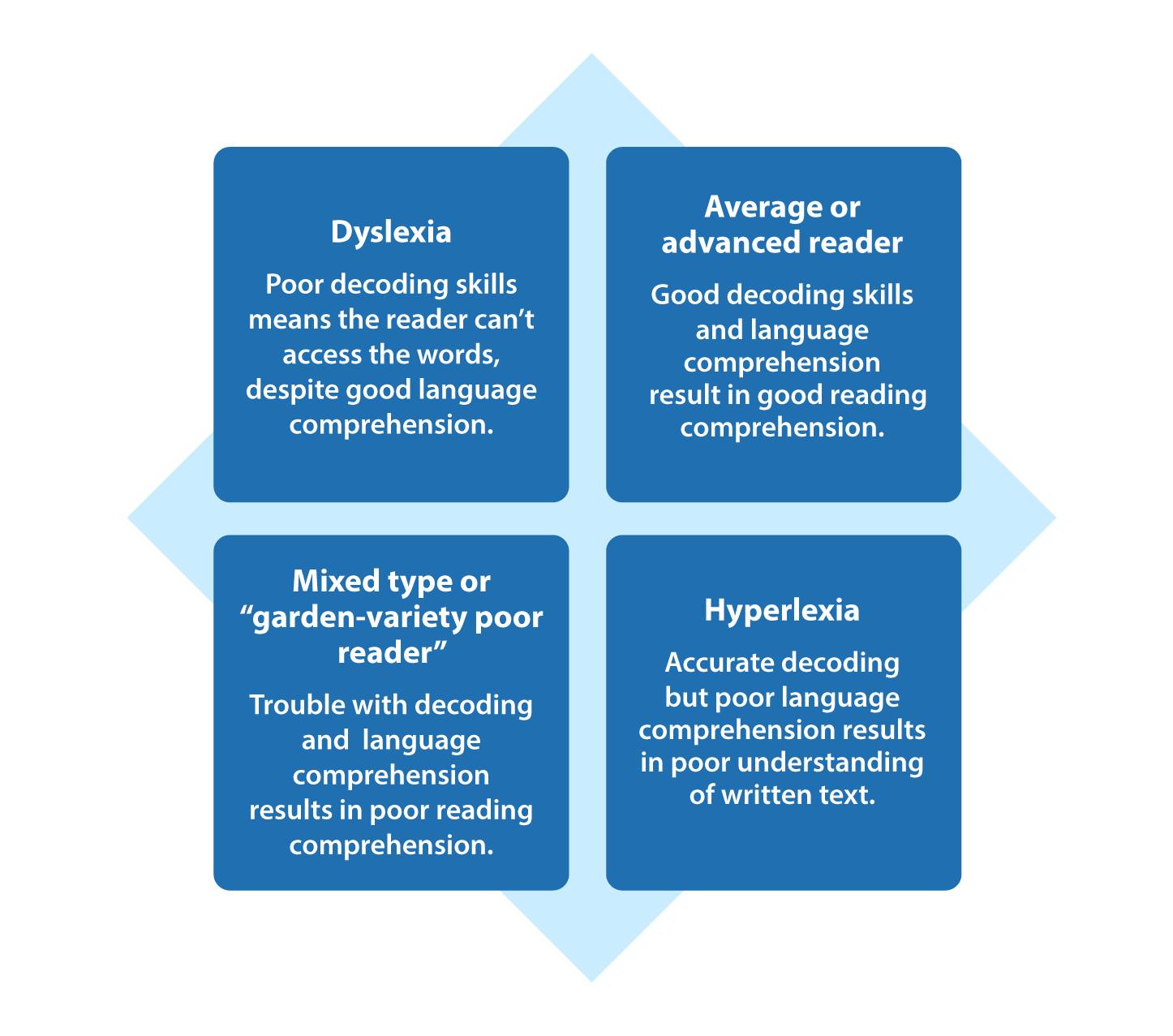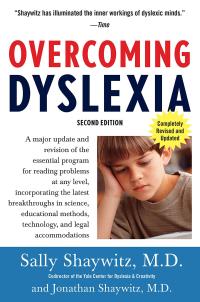What kind of reading disability?
Learning how to read is a complex process. When a child has trouble with reading, it can be difficult to tease apart the exact causes and how to fix it. A child with a suspected reading disability must be carefully assessed to determine the root causes of the reading problem and to plan targeted support.
Many parents and educators hear about a reading problem and immediately think it’s dyslexia. But dyslexia represents one type of reading disability.
Researchers have identified three subtypes of reading problems using the two components of the simple view of reading equation (decoding vs. language comprehension) as a guide. This reading component approach looks at the individual differences among poor readers (Aaron, 1997; Catts & Kamhi, 1999; Savage, 2001) and identifies three main types of reading problems:
- Students with poor word reading (decoding) skills
- Students with poor language comprehension skills
- Students with poor word reading and poor language comprehension skills
Reading disabilities tend to fall along a continuum of mild to severe (Vellutino, Fletcher, Snowling & Scanlon, 2004). Although many children do not fall neatly into a specific category, using this model helps schools to plan interventions that target specific strengths and weak areas in decoding and language comprehension.

Poor word reading skills: dyslexia
Dyslexia is a condition that affects how the brain processes written and spoken language. Students with dyslexia have trouble learning to read printed words and tend to read less accurately and more slowly than their peers. They may have difficulty with spelling words and acquiring a sight word vocabulary. Older students may also experience difficulties learning a foreign language. Students with dyslexia may have strong language comprehension but poor decoding skills. Slow, labored reading with errors can make it hard to understand and remember what is read.
Dyslexia is a language-based problem. Children with dyslexia often have trouble hearing and manipulating individual speech sounds or phonemes in words. This makes it harder for them to read.
The exact causes of dyslexia are still not completely clear, but brain imagery studies show differences in the way the brain of a person with dyslexia develops and functions. Dyslexia is not due to either lack of intelligence or desire to learn — or to hearing or vision issues. With explicit, systematic instruction and targeted support, children with dyslexia can become skilled, confident readers!
What is dyslexia?
Reading expert Margie Gillis, EdD, explains what dyslexia is, dyslexia symptoms, common dyslexia teaching strategies, and dyslexia treatment exercises. (From Understood)
Other reading disabilities
Poor language comprehension skills: specific reading comprehension deficit
Hyperlexia or “word callers” can readily decode words but don’t understand what the text means. This type of reading disability is now called specific reading comprehension deficit or impairment (Oakhill & Cain, 2006).
Prevalence of hyperlexia is difficult to estimate since teachers often inaccurately identify word callers (Hamilton & Shinn, 2003). Word callers are rare in the primary grades. Meisinger et al (2009) reported that 10% of upper elementary students were identified as word callers by the end of 5th grade.
Poor word reading and language comprehension skills
The most common type of reading problems involves both word-level and language comprehension problems. David Kilpatrick calls these “mixed subtypes” or as Keith Stanovich (1988) famously labeled this type of reading problem as “garden variety poor reading”.
Dyslexia and other reading disabilities are not a sign of low intelligence or laziness. There is not currently a single “test” that can diagnose dyslexia or other specific reading disabilities, but educators can screen and diagnose a student’s knowledge of key reading skills using a variety of tests and look at a child’s response to instruction as a tool for identifying reading disabilities.
Children with reading disabilities have many strengths and talents. They can excel in many fields and professions, such as art, music, science, engineering, business, and more. The key to overcoming reading disabilities is to get the right support and intervention as early as possible.
Learn more about dyslexia
Dyslexia
FAQs About Dyslexia
Dyslexia
Dyslexia Basics
Shanahan on Literacy
Early Identification: Predicting Reading Disabilities and Dyslexia
American Speech-Language-Hearing Association
Disorders of Reading and Writing
Assessment and Evaluation
Dyslexia in the Schools: Assessment and Identification
Guides and Toolkits
The Dyslexia Toolkit
Assessment and Evaluation
Common Types of Reading Problems and How to Help Children Who Have Them
Understood
Understanding Dyslexia in Your Child
Curriculum and Instruction
Effective Reading Instruction for Students with Dyslexia
Books about dyslexia

Dyslexia: Revisiting Etiology, Diagnosis, Treatment, and Policy

Overcoming Dyslexia (2020 Edition)

Conquering Dyslexia: A Guide to Early Detection and Intervention for Teachers and Parents
Featured video on dyslexia
Browse our Dyslexia resource library
Learn more about dyslexia, including early signs, support for parents, expert Q&A, videos, and research briefs. Visit our Dyslexia section
















